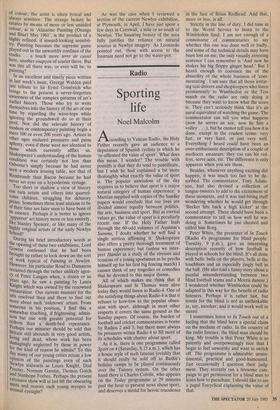Radio
Sporting life
Noel Malcolm
According to Vatican Radio, the Holy Father recently gave an audience to a deputation of Spanish cyclists in which he `re-affirmed the value of sport'. What does this mean, I wonder? The trouble with pontiffs is that they do tend to pontificate, but I wish he had explained a bit more thoroughly what exactly the value of sport is. The popular unwisdom of the day requires us to believe that sport is a major natural category of human experience: a Martian supplied with copies of the Sunday papers would conclude that our lives are divided almost equally between politics, the arts, business and sport. But as eternal values go, the value of sport is a peculiarly recent one. If the Holy Father leafs through the 60-odd volumes of Aquinas's Summa, I doubt whether he will find a single section affirming it. Shakespeare also offers a pretty thorough treatment of human experience; but (unless we inter- pret Hamlet as a study of the stresses and tensions of a young sportsman as he psychs himself up for his first big fencing match) I cannot think of any tragedies or comedies that he devoted to this major theme.
All of which makes me think that if Shakespeare and St Thomas were alive today they would listen to Radio 4. One of the satisfying things about Radio 4 is that it refuses to kow-tow to the popular obses- sion with sport, although in most other respects it covers the same ground as the Sunday papers. Of course, the burden of football and cricket commentaries is borne by Radios 2 and 3; but there must always be pressures within Radio 4 to fill more of its schedules with chatter about sport.
As it is, there is one programme called Sport on 4 (Saturday, 8.15 a.m.), which has a house style of such fatuous joviality that it should really be sold off to Butlin's holiday camps to be played continuously over the Tannoy system. On the other hand there is Charles Colvile, who appears on the Today programme at 29 minutes past the hour to present news about sport, and deserves a medal for heroic truculence in the face of Brian Redhead. And that, more or less, is all.
Strictly in the line of duty, I did tune in to the World Service to listen to the Wimbledon final. I am not enough of a connoisseur of commentaries to say whether this one was done well or badly, and some of the technical details may have been lost on me; the only visually arresting sentence I can remember is 'And now he shakes his big floppy ginger head.' But I heard enough to convince me of the absurdity of the whole business of 'com- mentating'. I am sure that all those irritat- ing taxi-drivers and shopkeepers who listen permanently to Wimbledon or the Test match on the radio are only doing it because they want to know what the score is. They can't seriously think that it's an aural equivalent of watching the game. The commentator can tell you what happens (now he serves an ace, now he hits a volley . . .), but he cannot tell you how it is done, except in the crudest terms: very fast, or very hard, or just very well, Everything I heard could have been an over-enthusiastic description of a couple of mediocre amateurs: they too can hit vol- leys, serve aces, etc. The difference is only apparent when you see them.
Besides, whenever anything exciting did happen, it was much too fast to be de- scribed. The commentator, Tony Adam- son, had also devised a collection of tongue-twisters to add to the excitement of these moments, and it was nail-biting stuff wondering whether he would get through `Becker hits back a high kicker' at the second attempt. There should have been a commentator to tell us how well he was doing it. Sometimes he just cheated and called him Borg.
Peter White, the presenter of In Touch (Radio 4's programme for blind people: Tuesday, 9 p.m.), gave an interesting description recently of how football is played at schools for the blind. It's all done with bells: bells on the players, bells at the touchlines and an especially jingly bell in the ball. (He also told a funny story about a painful misunderstanding between two blind football teams and a Morris dancer.) I wondered whether Wimbledon could be adapted in this way for the benefit of radio listeners. Perhaps it is rather fast, but tennis for the blind is not as unthinkable as, say, snooker; and it would work well in stereo.
I sometimes listen to In Touch out of a feeling that the blind have a special claim on the medium of radio. In the country of the radio listener, the blind man should be king. My trouble is that Peter White is so patently and overpoweringly nice that I begin to feel unworthy and want to switch off. The programme is admirable: unsen- timental, practical and good-humoured. Just occasionally I question their judg- ment. They recently ran a tiresome cam- paign to get permission for a blind man to learn how to parachute. I should like to see a papal Encyclical explaining the value of that.


















































 Previous page
Previous page